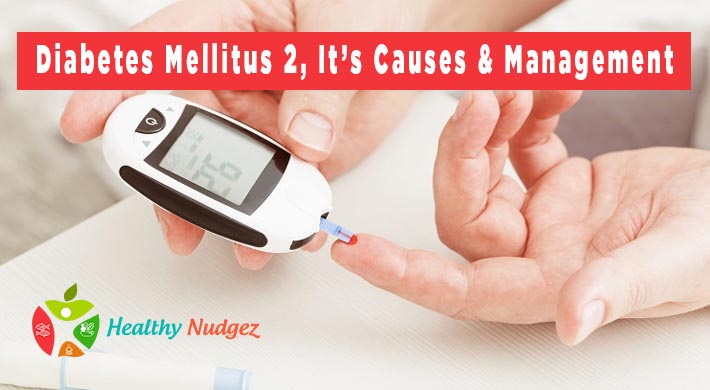Diabetes Mellitus 2, it’s causes and Management
What is Diabetes Mellitus type II (type 2 DM) and its causes?
DM type II is a chronic metabolic disorder characterised by an increase in the blood sugar levels. It is caused by insufficient insulin production by the pancreas and resistance of the body cells to insulin action. The factors associated with the development of type 2 DM are age, family history of diabetes, waist-hip ratio, obesity, sedentary lifestyle Body mass Index, high blood pressure and lipid levels.
A diet rich in refined carbohydrates, processed sugary and fatty foods predisposes one to the risk of obesity, increased blood lipid levels and type 2 DM.
Management of type 2 DM:
Management strategies of type 2 DM include lifestyle modifications, treatment of obesity and oral hypoglycaemic agents. Lifestyle encompasses changes in diet pattern, increased physical activity, and stress management.
Studies have shown a significant reduction in the incidences of type 2 DM with a combination of maintenance of BMI below 25 kg/m2 , eating high fibre low fat diet low in trans and saturated fats, including foods low in glycemic index, low glycemic load meals, regular exercise, abstinence from smoking and moderate consumption of alcohol.
What is glycemic index (GI) and glycemic load (GL)? How they help in the management of type 2 DM?
GI is a scale which ranks carbohydrate rich food by their capacity to increase blood sugar levels as compared to pure glucose.
GL is the product of the GI of a food with the amount of carbohydrate present in one serving of that food divided by 100.
GL takes into account both the quantity and the quality of the carbohydrate present in food and its influence on the glycemic response (the rate of increase of blood sugar levels) after its consumption.
Low GI foods are generally high in fibre (complex carbohydrates) and will have the following effects:
• These control blood sugar levels
• Control appetite
• Control cholesterol and
• Lower the risk of developing complications caused due to type 2 DM
Examples of low GI foods are whole grains, Legumes, vegetables and whole fruits.
Moderation is the key to keeping both blood sugar and blood lipid levels in control. People with type 2 DM should neither fats nor feast. It is important to eat small amounts of foods at an interval of 2and half to 3 hours.
IMPORTANT DO’S AND DONT’S
1. Eat 5-6 Small Frequent Timely meals
2. FATS:
5gm/ 1tsp. = 45 Cal
Restrict saturated fats: Butter/ Ghee/ Coconut toil/ Vanaspati
Avoid Fried Foods: Paranthas, potato chips, puris, and samosas, Cheese / Mayonnaise /
Margarine
Prefer Combination of oils: Refined oil+ Olive oil/ Corn oil/ Groundnut oil/canola
oil/mustard oil
3. SUGAR:
1tsp. = 20 Cal
either take in MODERATION / AVOID e.g. Honey, Jam, Jelly, Jaggery, Sugar Squashes, Coldrinks, Desserts, Pudding, Sweets, Ice Creams, Chocolates, Pastries, Cakes
4. MILK:
100 ml Full cream milk = 100 Kcal
100 ml Toned milk = 60 Kcal
AVOID
PREFER
Full cream milk
Toned/double toned milk/skimmed milk
Un-pasteurized milk
Pasteurized milk
100 ml Double-Toned milk = 40 Kcal
5. MEAT AND PRODUCTS:
80- 100gm (2 pc) Chicken/ fish – Cal -140 kcal, Protein – 14gms
| AVOID | Prefer |
| Red Meats | Lean Meat |
| Ham, Organ Meats | Chicken |
| Canned and Processed Meat | Eggs |
| Sausages | Fish |
6. PULSES:
¾-1 Bowl (30gm raw) cooked dal Cal – 150 kcal
PREFER
Whole Pulses/ Soya Beans/ Sprouts
Sprouts – 30gm raw (1 cup)
Roasted Gram – 30gms raw (1/2cup)
Besan – 30gms (6 level tsp.)
7. CEREALS/ GRAINS
20gms of cereal Cal – 70 kcal
PREFER: whole cereals like whole wheat, daliya, oats, ragi, brown rice, pasta and vermicelli
Etc., made of wheat etc
MODERATION/AVOID : refined cereals like refined flour maida and its products, white
bread, pasta and foods made of white flour
8. VEGETABLES AND FRUITS:
100 gm vegetables – 35-60 kcals
100 gm Fruits – 80 kcals
Good source of fiber
Have plenty of salads and minimum 2 fruits/ day
It’s better to have a whole fruit than a glass of fruit juice, aerated drink
MODERATION/ AVOID
Vegetables – Potatoes, Arbi, Sweet Potato, yam
Fruits: Mango, ,Banana, Custard Apple, Sapota (Cheeku), Grapes, Fruit juices, squashes, concentrates and sweetened sodas.
9. SALT: it is best to consume salt in moderation. 1-1 ½ spoon per day iodized salt intake is recommended
10. Water: 10-12 glasses per day
It is Best to consult a Dietician for personalized Diet Plan as Diet charts are based on age, height, weight, food habits, preferences, lifestyle, etc.

